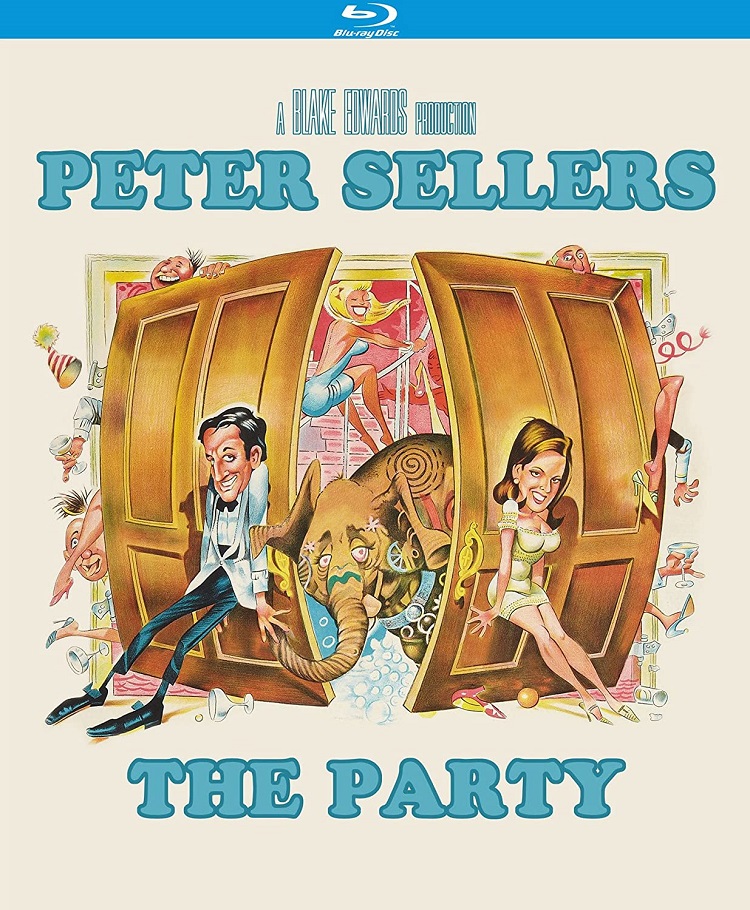
Written by S. Edward Sousa
We open on a desert film set, the high-strung director—played with ‘look at me, Ma’ gusto by eternal character actor Herb Ellis—appears over budget and out of time in constructing his latest, Gunga-Din style epic. There’s elaborate sets and high priced explosives, an expanse of extras to coordinate and Hrundi V. Bakshi, a bumbling Indian character actor hot off the Bollywood Express. He’s here to goof it all up, infuriating the extras until they turn their guns on him on like a prop armored firing squad. Bakshi manages to make it through the shoot, pun intended, until the last day when he prematurely, accidentally detonates the final scene’s pyrotechnics as the cameras sit idle.
It’s all set-up for Blake Edwards late-60s cultural farce The Party, starring Peter Sellers as Bakshi. The gags and giggles come quick and easy in this loosely structured comedy as Bakshi, who is to have been blacklisted for his on-set antics, is mistakenly guest listed to a Hollywood soiree at the home of studio executive Fred Clutterbuck, an overworked and flustered stiff. The social type, with a near noble savage smirk throughout the film, Bakshi rolls into Clutterbuck’s Hollywood Hills estate in a Morgan three-wheeler to the sound of Henry Mancini’s swelling score accented by psychedelic sitars. Ravi Shankar goes to the Met.
The ensuing series of mishaps and behavioral pratfalls are based solely on Bakshi’s misguided cultural assumptions and the party-goer’s misguided social expectations. Edward’s vibrant palate, crafted with legendary director of photography Lucien Ballard (The Killing, The Wild Bunch), is illuminated in this recent transfer and the precision of Blu-ray draws out the film’s color scheme keeping this send-up’s groovy vibes intact. Sellers and Edwards—the latter of whom penned the script with Tom & Frank Waldmen; a tight premise with plenty of wiggle room for Sellers to be Sellers—had by this time become strained of each other. Their work and identities were wound too tight in the success of their Pink Panther collaborations, a series they backed off of for more than a decade.
But upon this reunion the two manage to facilitate a comedy of cultural errors as Bakshi becomes a stand-in for hippies, for the turn-off, tune-in, drop-out generation looking to thumb their noses at the establishment. Bakshi is persona non grata at a dinner party full of wealthy white film-industry insiders, flowing tuxedo tails and long gowns being served by a black tie wait staff. For Christ’s sake there’s a cowboy running around, a smarmy Denny Miller as “Wyoming Bill” Kelso, legendary wild west film star. As the butt of multiple jokes “Wyoming” Bill embodies the mythical American past Edwards seem so set on upending, or at the very least undermining. Wyoming has a way with women and a pool cue. He’s dressed in full and impractical nudie suit style regalia and takes it right between the eyes from the Indian Bakshi with a toy gun. It’s an unsubtle metaphor as they attempt to kill the past with the very pastime it facilitated. The Manneken Pis, placed in the flowing stream that guides guests from the atrium to the backyard, urinates all over guests as the wait staff grows intoxicated sneaking sips of drinks off guests’ cocktails. This is all before the legendary “Birdie Num Nums” scene, flying game hen and intercom mishaps as the party dissolves into a suds-soaked, drunken free-for-all with the soundtrack singing “the party is groovy and everyone loses control.” Intentional or not, this Far Eastern Indian has subverted and radicalized the status quo.
Sellers is arguably taking a racist turn in this movie, relying heavily on the use of what we might call “brownface,” the light application of skin toner to make him appear Indian. Believe me it’s offensive, but it’s no Mickey Rooney in Breakfast at Tiffany’s. While Sellers as Bakshi embodies the hippie fascination with Eastern philosophy—the Beatles and their Gurus, The Human Be-In, et al. until the Hippie yells, “Hey where you going with my TV and toilet.”—he also turns the longstanding and contentious relationship between England and India, a former colony of the British Empire, on its head. Sellers disrupts this longstanding stratification by making Bakshi the great liberator of polite culture. There’s an underlying and misguided subversion to this film, heavily influenced by liberal wealth—let’s remember Edwards, The Waldmans, Sellers are the very party-goers being harassed by Bakshi—and Britain’s own celebratory vision on the Swinging ’60s. Nobody really wants change, they just want to feel like it’s okay to boogie, man. Hence the final absolute freak-out dance party that closes the film.
Edwards and Sellers were comedy masters, each in their own right—though Edwards has quite a few misfires in his filmography, most notably post-Sellers Pink Panthers—but they seem to have been at their best working with each other. Edwards sense of style guides Sellers brand of anarchic humor. Class is always at play with Sellers, his penchant for goofing on manners is an endless source of laughter.
The problem with this recent Blu-ray release, and most films made before 1980, is their lack of worthwhile extras. Created at a time when the home video market didn’t exist, no one thought to have Sellers or even Edwards for that matter, record a commentary track and the few extras culled together here are pithy at best. The transfer is stellar though and Edwards’ and Ballard’s radical vision remains dense and vibrant enough to spotlight the total absurdity of Sellers racial insensitivity.